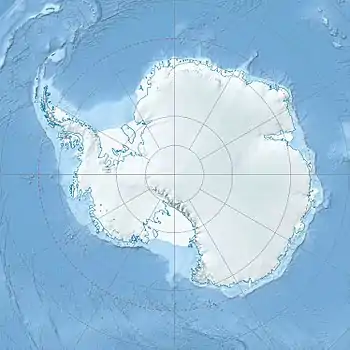Vetrilo Rocks
Vetrilo Rocks (Bulgarian: скали Ветрило, romanized: skali Vetrilo, IPA: [skɐˈli vɛˈtriɫo]) is the group of rocks lying in an aquatory of 27 ha that extends 970 m in west-southwest to east-northeast direction and 485 m in south-southeast to north-northwest direction in the Wauwermans Islands group of Wilhelm Archipelago in the Antarctic Peninsula region. Their surface area is 27 ha.[1]
 Vetrilo Rocks Location of Vetrilo Rocks  Vetrilo Rocks Vetrilo Rocks (Antarctic Peninsula) | |
| Geography | |
|---|---|
| Location | Antarctica |
| Coordinates | 64°56′57″S 64°00′26″W |
| Archipelago | Wilhelm Archipelago |
| Area | 27 ha (67 acres) |
| Length | 970 m (3180 ft) |
| Width | 485 m (1591 ft) |
| Administration | |
| Administered under the Antarctic Treaty System | |
| Demographics | |
| Population | uninhabited |
The feature is so named because of its shape supposedly resembling a hand fan ('vetrilo' in Bulgarian), and in association with other descriptive names of islands in the area.[1]
Location
Vetrilo Rocks are centred at 64°56′57″S 64°00′26″W, which is 3.18 km south of Host Island, 5.55 km west-northwest of Zherav Island, 2.11 km north of the midpoint of Yato Rocks, and 4.7 km northeast of Kalmar Island in the Dannebrog Islands group. British mapping in 2001.
Maps
- British Admiralty Nautical Chart 446 Anvers Island to Renaud Island. Scale 1:150000. Admiralty, UK Hydrographic Office, 2001
- Brabant Island to Argentine Islands. Scale 1:250000 topographic map. British Antarctic Survey, 2008
- Antarctic Digital Database (ADD). Scale 1:250000 topographic map of Antarctica. Scientific Committee on Antarctic Research (SCAR). Since 1993, regularly upgraded and updated
See also
- List of Antarctic and subantarctic islands
Notes
- Vetrilo Rocks. SCAR Composite Gazetteer of Antarctica
References
- Vetrilo Rocks. SCAR Composite Gazetteer of Antarctica
- Bulgarian Antarctic Gazetteer. Antarctic Place-names Commission. (details in Bulgarian, basic data in English)
External links
- Vetrilo Rocks. Adjusted Copernix satellite image
This article includes information from the Antarctic Place-names Commission of Bulgaria which is used with permission.